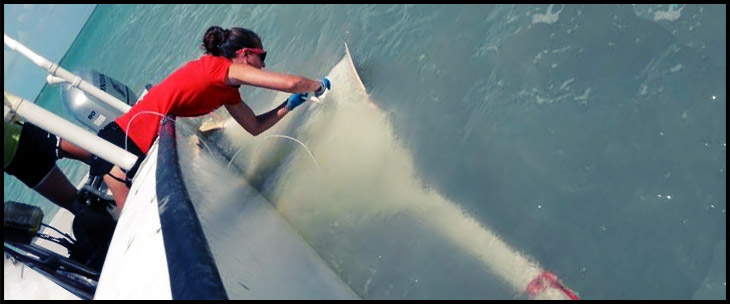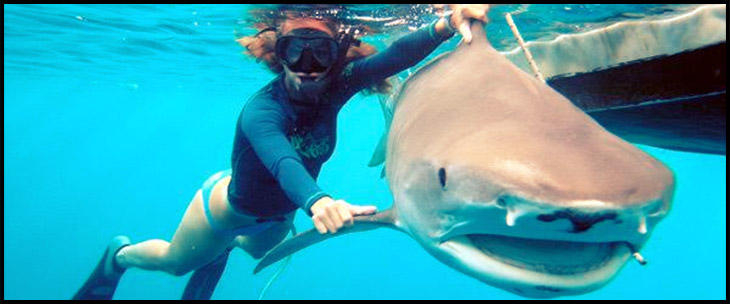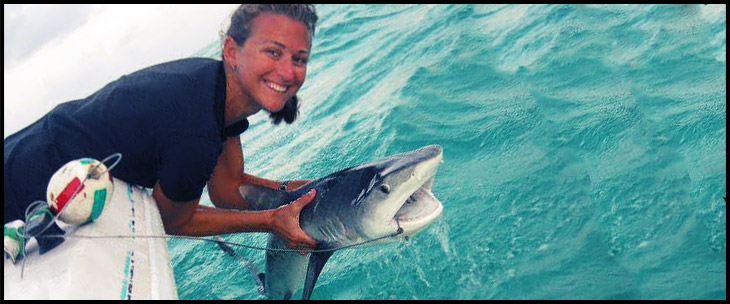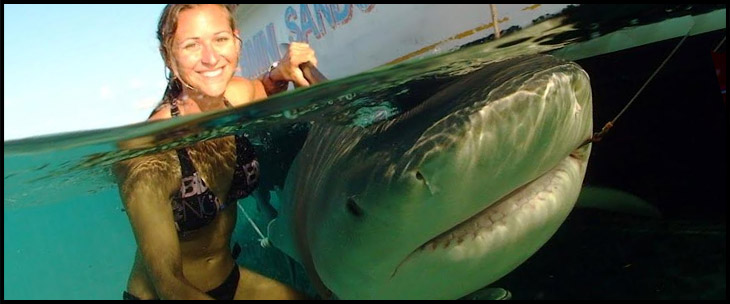If you were a shark, what would you be?
Lemon shark. It’s a tropical coastal species, spending lots of time on coral reefs and in mangrove channels. Much like myself.
Could you summarize what you do for research?
The biggest shark project I worked on was my dissertation research, which was looking at the effects of anthropogenic nursery habitat loss on juvenile lemon sharks in The Bahamas. One of the methods I used was telemetry, or animal tracking. I now use a similar technique to study Nassau Grouper in The Bahamas in my current position at the Shedd Aquarium.
What does a typical field day look like?
Controlled chaos?! Seriously, though, we make a plan based on the kind of data we’re trying to collect, but things often change once we get out there due to any number of unexpected challenges, like inclement weather or technical difficulties with equipment. What we do specifically depends on the day, but can involve fishing gear, tagging equipment, scuba diving, cameras and of course, underwater paper! Generally, field days start early and end late so we can maximize time out on and in the water. A LOT of planning goes into fieldwork, and it’s always a team effort.
What inspired you to start doing this?
I can’t remember a time when I wasn’t interested in being a marine biologist, and in sharks specifically, but a few experiences in particular really solidified it for me as a career path: the shark books my mom bought me when I was growing up, a session at Seacamp in the Florida Keys in high school, the University of Miami’s undergraduate “saltwater semester” for marine science majors in college, and volunteering at the Bimini Biological Field Station (aka Bimini Sharklab) after college.

Why do you think it’s important?
The sciences are important not only for understanding what’s around us, but also how to conserve and sustainably manage our natural resources.
What is the hardest thing about doing this?
There are so many challenges. In general, research funding is often a big one. Often, research projects lead to more questions, which leads to the need for continued research and therefore more funding. There is so much to learn! Translating scientific results to resource managers and the general public is also challenging and takes a lot of practice, but it’s a very important skill to develop.

What is the most rewarding thing about it?
That my job is to be in the ocean!
What if others want to help in shark conservation – how can they help?
Anyone can make a difference. It starts with small, everyday choices. Choose to use less plastics and Styrofoam. Choose to carry a reusable water bottle instead of buying plastic water bottles. Choose to pick up that piece of trash in your way instead of walking around or over it. Simple things like this make a difference. Be a smart consumer. Take the time to learn about the places you patronize and products you buy, and make educated choices about where you do and don’t spend your money. Everything is connected, including oceans far away, and every little choice makes a difference.

Finally, do you have any advice for a young student wanting to study something like this? What would you tell them?
Best advice is that advice my mom gave me: get as much education as you can! To that I’d add my own advice, which is that along the way, go volunteer. In research labs, at field stations, whatever is available to you. You will learn a lot about yourself and what you want (and don’t want) to do.

































































































